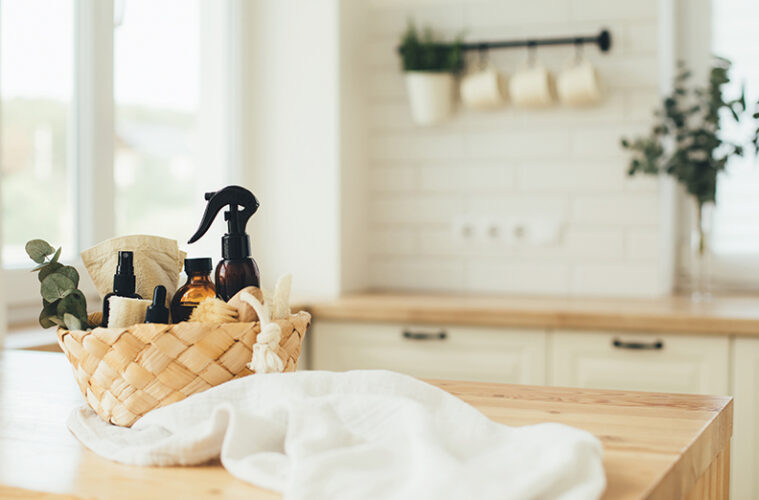BY THERESE REVITTE, MNT & TRACY McCUBBIN, MD, ABOIM, ABEM
“Detoxing” is a big buzzword these days. We’re constantly being reminded that our world is full of toxins. Our food, our water, our air, our cleaners, our personal care products…all contain various types of xenoestrogens, obesogens, heavy metals, pollutants, pesticides and antibiotics that get into our bodies. It can feel overwhelming to try to address all of these and it’s easy to feel defeated.
But don’t give up hope! Your miraculous body is well-equipped to process and remove toxins when given the right support. You can do this with a two-fold approach:
1. Support the body’s detox pathways by drinking plenty of water and eating detox-supporting foods every day. Also, doing a dedicated medical cleanse twice per year with Radiance Functional Medicine is another excellent way to clear toxics that have been stored in your body.
2. Take simple steps to keep toxins from entering your body. Removing toxin sources and making swaps to various products can go a long way toward detoxifying your environment.
Let’s talk about simple changes you can make to keep toxins from entering your body. Here are six areas where you can make these changes to reduce your toxin load.
Buy Organic Food
Conventionally grown/raised foods like produce, grains, eggs and meats have often been subjected to synthetic fertilizers and pesticides, hormones and antibiotics.
According to the USDA, produce can be called organic if it has grown in soil that had no synthetic fertilizers and pesticides for three years prior to harvest. For organic meat, animals are raised in living conditions accommodating their natural behaviors (like the ability to graze on pasture), fed 100% organic feed and forage, and not administered antibiotics or hormones.
An organic certification also ensures that the food is non-GMO and non-bioengineered.
Get Rid Of Plastics
Plastic packaging leaches hormone-disrupting microplastics into our foods and drinks. Switch from plastic to glass or stainless-steel water bottles. Store your food in glass containers. Buy foods and drinks in glass containers when possible. Consider trying beeswax wraps or parchment paper for storing certain foods.
Never heat foods in plastic or drink hot drinks out of plastic (including plastic covers over your coffee). The heat intensifies the leaching of microplastics.
Filter Your Drinking Water
Even municipal tap water contains chemicals that we’d rather not have in our bodies, including trace pharmaceuticals, hormones and chlorine. Simple activated charcoal filters remove about 30 contaminants from your water. These are typically found in your refrigerator filter or in pitcher filters like Brita.
Countertop filters such as Berkey and AquaTru remove 75-200 contaminants. You can also investigate under-the-sink or whole-house reverse osmosis filters for maximum filtering.
Also, remember that the bottled water industry is largely unregulated, so don’t assume that bottled water is healthier.
Get Rid Of Artificial Fragrances
Even though they might smell great, artificial fragrances are typically made from hormone-disrupting chemicals.
Ditch the plug-ins and air fresheners and use a diffuser with pure essential oils instead. Buy products that are scented only with essential oils. Buy products that use plant-based ingredients for their effectiveness and fragrance. Choose fragrance-free products (note that “unscented” may mean that another chemical has been added to mask smells).
Simplify Your Cleaning Products
We absorb cleaning products through our skin and by inhaling them. Most common cleaning products contain harmful chemicals and hormone-disrupting fragrances. Some can even be more dangerous when mixed together.
Switch to ingredients you likely already have in your kitchen. Use baking soda to scrub your sink and tub, vinegar water to clean your hardwood floors and glass. A mild dishwashing soap or vinegar water is often all that is needed to clean kitchen and bathroom counters.
Use resources such as Organic Consumer’s Association and EWG’s Guide to Healthy Cleaning for more guidance on choosing less-toxic products.
Clean Up Your Indoor Air
Indoor air can be more polluted than outdoor air! Many items in the home can release (“off-gas”) toxins into the air, such as new furniture, new carpet, cleaning products, nail polish, paint fumes, air fresheners, and volatile organic compounds from cooking at high heat. Dust and pets also cause allergy reactions.
The simplest way to clean up your indoor air is to open your windows and doors! Use ventilation fans when using products that produce fumes or cooking at high heat. Remember to change your HVAC air filter every 1-3 months. Invest in house plants known to clean toxins from the air.
Every small change toward detoxifying your environment matters. While these tips may sound like a lot of work all at once, adding one new step at a time soon leads to new habits that pay dividends in your health!

